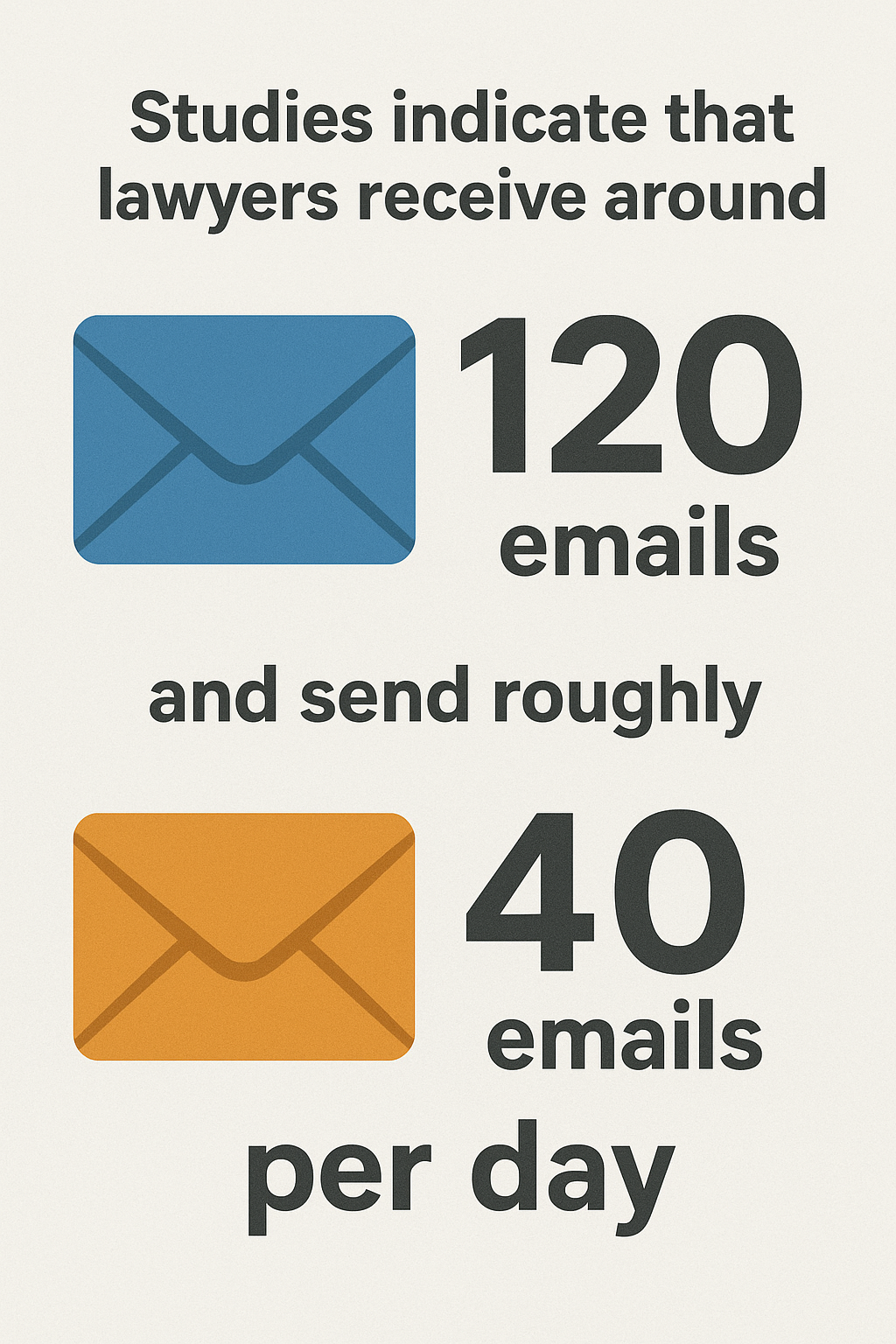For most law firms, email remains the central hub of communication. Attorneys, paralegals, clients, and external stakeholders rely on it daily for everything from case updates to sensitive document exchanges. But as essential as email is, it’s also a source of bottlenecks, compliance risks, and inefficiency.
Studies indicate that lawyers receive around 120 and send roughly 40 emails per day. (Source: American Bar Association)
Managing email well is not just about inbox zero, it’s about structuring communication in a way that keeps client data secure, ensures compliance, and allows teams to focus on high-value legal work.
In this article, we’ll explore the challenges law firms face with email, best practices for tackling them, and why solutions like Gmelius are helping firms modernize their communication workflows.
The Challenges of Email in Legal Practice
Legal professionals face email challenges that go beyond simple inbox overload. Here are some of the biggest hurdles:
- Overloaded inboxes across attorneys and paralegals
In busy firms, attorneys may receive hundreds of emails a day. Without proper organization, critical updates can get buried. - Difficulty organizing case-related communication
Traditional email systems don’t make it easy to separate messages by client or matter. Threads can become tangled, and finding the right email later often wastes valuable time. - Compliance and retention requirements
Law firms are bound by strict record-keeping policies. Failing to retain or properly archive certain communications can put the firm at legal risk. - Security risks in client-attorney communications
Sensitive information is routinely exchanged via email. Without encryption and strict access controls, client confidentiality can be compromised.
These issues add up to real consequences: missed deadlines, ethical breaches, and frustrated clients.

Best Practices for Managing Email in a Law Firm
So, how can law firms get email under control? A mix of workflow improvements and the right tools is essential.
1. Use matter-centric email organization
Emails should be automatically grouped by client, case, or subject matter. Tools like Gmelius’ AI assistant make this possible by sorting messages contextually, so legal teams can instantly see all communications related to a specific case.
2. Implement strict security and encryption protocols
Protecting client data is non-negotiable. Using Swiss-grade security protocols, Gmelius ensures emails are encrypted and only accessible to authorized team members. This safeguards attorney-client privilege.
3. Set up role-based shared inboxes
Instead of forwarding client emails around, firms can use shared inboxes for practice areas or client teams. With role-based permissions, everyone sees the same thread, and responsibilities can be assigned transparently.
4. Automate archiving and retention policies
Manually managing retention is inefficient and risky. Automating archiving rules ensures compliance while freeing staff from repetitive tasks.
5. Train staff on email etiquette and compliance
Technology helps, but people matter too. Firms should regularly train attorneys and support staff on proper email practices, from secure file sharing to handling confidential client instructions.
6. Leverage AI for smarter email management
AI can prioritize important emails, suggest replies, schedule follow-ups, and flag sensitive content for compliance. By reducing inbox clutter and automating routine tasks, AI inbox management lets attorneys focus on high-value legal work while keeping communication organized and secure.
Tools and Platforms That Support Law Firm Email Management
The right platform can make or break a law firm’s ability to manage email effectively. Look for tools that offer context aware email sorting and project management, custom integration with your existing software, and critical features like search, tagging, access control, and audit trails.
Top platforms include:
- DocsVault for Outlook, which helps organize and archive legal correspondence directly in Microsoft environments.
- Gmelius for Gmail, providing AI-powered context-based organization, shared inboxes, and Swiss-grade security, ideal for firms running on Google Workspace.
- MyCase, an all-in-one case management platform with built-in client communication and email tools.
- Clio, which integrates case management with email tracking and compliance features.
By selecting the right platform, firms can reduce inbox chaos, improve collaboration, and ensure they meet strict compliance requirements.
Common Mistakes Law Firms Should Avoid
Even with the best tools, firms can fall into email management pitfalls. Here are three common mistakes to avoid:
- Mixing personal and professional correspondence
Using personal accounts for client matters creates unnecessary security risks. Firms should enforce strict separation. - Ignoring data retention requirements
Failing to store emails according to bar association or local jurisdiction rules can result in compliance violations. - Failing to enforce firm-wide email policies
Inconsistent practices across attorneys create silos and confusion. Standardized protocols are essential. - Lack of cybersecurity training: Educate employees on how to recognize and avoid phishing attempts, ransomware, and other cyber threats that target law firms
- Not setting boundaries: Keeping email open all day with constant notifications pulls attorneys away from critical tasks. Instead, set designated times to check and process emails. With Gmelius, you can minimize distractions by snoozing non-urgent threads, prioritizing case-related emails, and automating routine follow-ups so your inbox works around your schedule, not the other way around.
Getting Started With an Email Management Platform
The first step is auditing how your firm currently handles email: Where are the bottlenecks? Which risks are most pressing?
From there, you can define what’s essential in a platform, whether that’s AI-powered sorting, shared inboxes, or compliance automation.
Gmelius offers law firms an end-to-end solution that goes far beyond Gmail’s default features. By combining AI-powered email management, shared inboxes, advanced security, and automation, it transforms email from a liability into a strategic asset.
%2012.00.26%E2%80%AFp.%C2%A0m..png)
FAQs on Email Management for Law Firms
1. How do law firms ensure email compliance?
Law firms should implement automated retention and archiving policies, alongside access control and audit trails. Tools like Gmelius help ensure all communication is securely stored and compliant with industry regulations.
2. What is the safest way for law firms to use email?
The safest approach includes encryption, secure shared inboxes, and strict separation of personal and professional correspondence. Gmelius uses Swiss-grade security protocols to keep client communications protected.
3. How can law firms reduce email overload?
Adopting matter-centric organization, AI-powered sorting, and shared inboxes helps teams cut through clutter. For example, Gmelius AI automatically categorizes emails by client or case.
4. What features should law firms look for in an email platform?
Look for advanced search, tagging, encryption, access controls, and seamless integration with existing legal software. These features improve both productivity and compliance.
5. How can AI help email management in law firms?
AI can automatically schedule follow-ups, send reminders, and suggest draft replies. This ensures no critical communication is overlooked and reduces the administrative burden on attorneys.
Final Thoughts
In legal work, email is essential to client communication, but it’s also one of the biggest sources of inefficiency and risk. Managing it effectively requires more than ad hoc fixes: it demands structured workflows, strong security, and the right technology.
By adopting best practices and leveraging platforms, firms can reduce inbox overload, organize communications by case, and maintain compliance with retention policies and industry-leading protocols.
The result? Attorneys and staff spend less time digging through cluttered inboxes and more time practicing law
Your clients trust you with sensitive information. Don’t leave it at risk.
Use Gmelius’ Swiss-grade security to manage case emails safely and efficiently.
.png)


.avif)
.avif)
%20(1).avif)
.avif)

